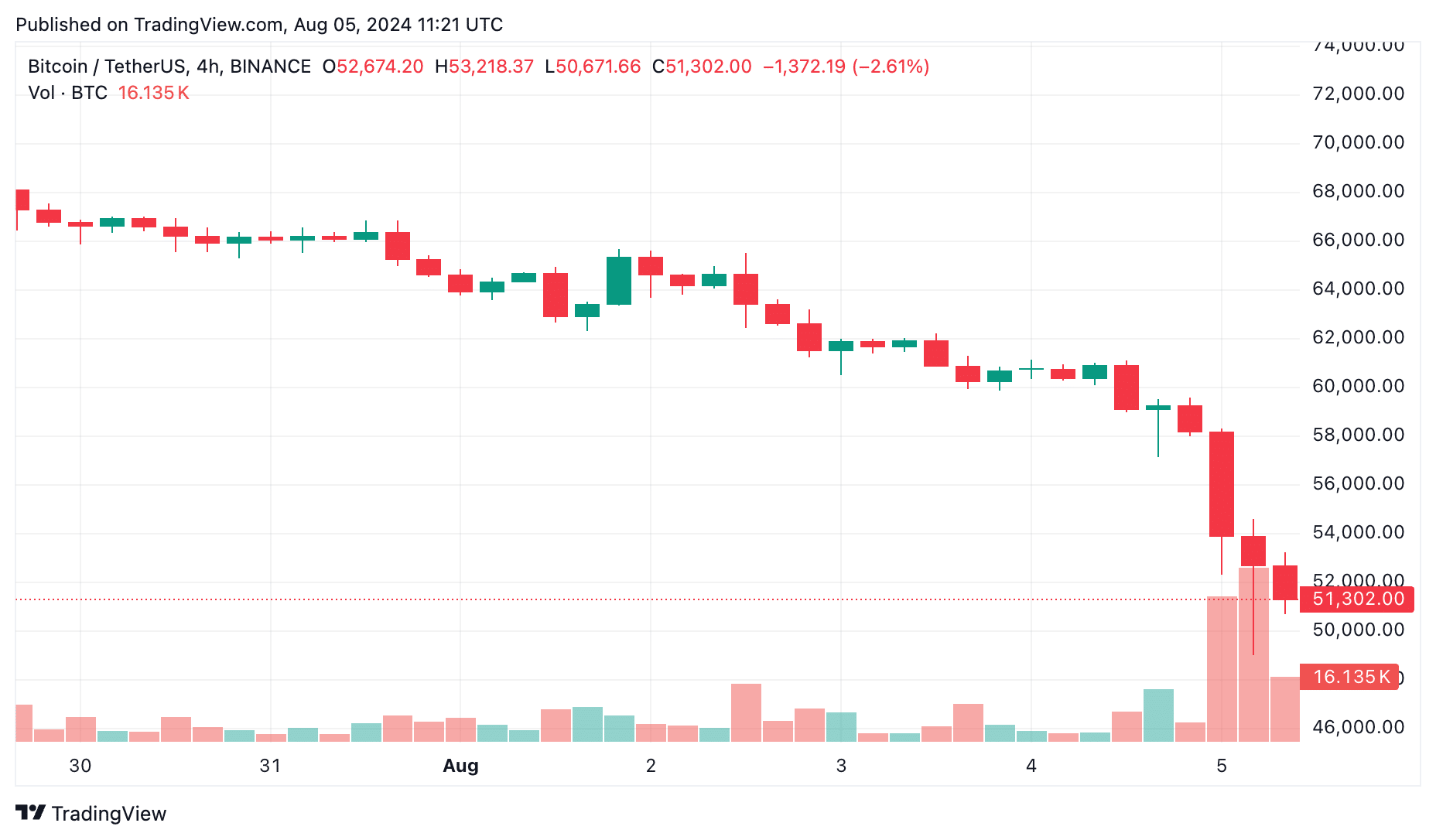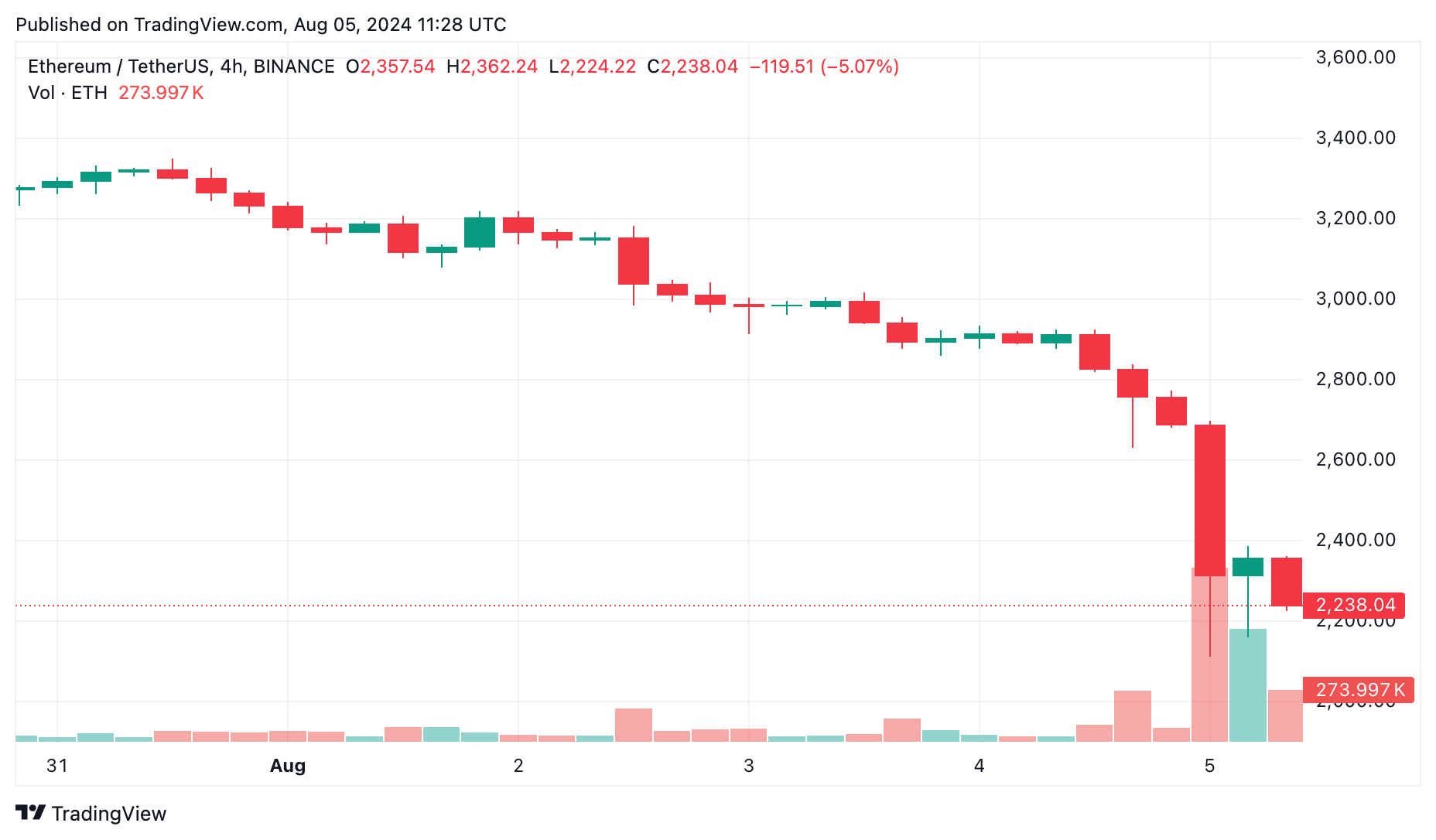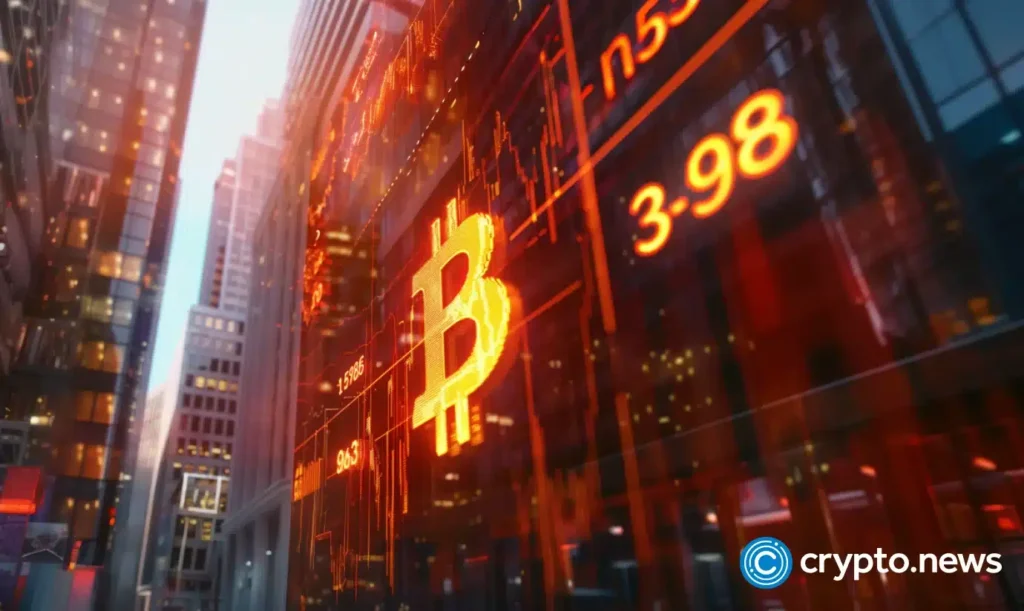What are the immediate global triggers that led to this massive cryptocurrency market crash? Read more
The cryptocurrency market has crashed abruptly, sending shockwaves through the financial world. As of August 5, the global cryptocurrency market capitalization stood at $1.81 trillion, a staggering 15.88% drop in a single day, triggering extreme panic and strong indications of a bear market.
Bitcoin (BTC) has fallen more than 25% in the past seven days, with nearly 15% of that decline occurring in the past 24 hours, trading at levels of $51,300 as of August 5.

Ethereum (ETH) has fared even worse, dropping 32% in the past week and over 21% in the past day, trading at levels of $2,238 at the time of writing.

Other altcoins have also been hit hard, dropping between 40-50% over the week and 15-25% in the last 24 hours.
The turbulence is not limited to the cryptocurrency market. Major global stock indices like the NASDAQ100 (US), FTSE100 (UK) and NIFTY50 (India) have seen sharp declines of 2-3% in a single trading session.
Japan’s Nikkei 225 was the worst hit, falling nearly 14% in one day, marking its biggest drop since 1987.
So why are cryptocurrencies crashing right now? What are the global factors that are causing this widespread panic and leading to the collapse of all financial markets? Let’s look at the underlying reasons for this market turbulence.
What Happened to the Cryptocurrency Market: Deciphering the Factors
Fears of a recession in the United States
The recent collapse of the cryptocurrency market is not an isolated phenomenon. The US job market is showing signs of trouble, fueling fears of a recession.
According to data released on August 2, the unemployment rate in July hit its highest level in nearly three years, at 4.3 percent, up from 4.1 percent in June and a sharp increase from its lowest level in five decades, at 3.4 percent in April last year.
Goldman Sachs economists have raised the probability of a recession in the United States next year from 15 to 25 percent, Bloomberg reported.
Still, they noted that there were “several reasons not to fear a recession,” even with rising unemployment. According to Goldman economists, “the economy continues to perform well overall, there are no major financial imbalances, and the Fed has ample room to cut interest rates and can do so quickly if necessary.”
Some, however, worry that the Fed has “waited too long” to cut interest rates. The Goldman report suggests that if job growth picks up in August, a 25 basis point (bps) cut would be enough to mitigate downside risks. But if the August jobs report is as weak as July’s, a 50 bps cut might be needed in September.
Rising unemployment and fears of a potential recession are creating a domino effect. Investors are becoming more risk-averse and moving away from volatile assets like cryptocurrencies, leading to massive sell-offs in the crypto space.
When people fear a recession, they tend to sell riskier investments and hold on to safer assets like cash, gold or government bonds.
Nikkei 225 falls
The Japanese financial system is currently undergoing critical changes, which are impacting markets around the world.
On July 31, the Bank of Japan raised its policy rate to “around 0.25%” from its previous range of 0 to 0.1%. This is the second time this year that the Bank of Japan has raised rates, the first time on March 19, the first hike since 2007.
Although this move is intended to benefit the Japanese economy, it has a negative impact on the carry trade, a popular strategy among Forex traders and fund managers.
The carry trade involves borrowing money in a low-interest currency and investing it in assets that offer higher returns. When Japan raises interest rates, it makes the yen more attractive for borrowing, disrupting this strategy and triggering global financial adjustments.
The impact of Japan’s interest rate hike was felt immediately. The Nikkei 225 stock index plunged 12.4% on August 5, marking a broad-based decline.
One factor that pushed the BoJ to raise rates was the prolonged weakness of the Japanese yen, which pushed inflation above the central bank’s 2% target.
Early on August 5, the dollar was trading at 142.59 yen, down from 146.45 yen late Friday and well below its level of more than 160 yen a few weeks ago.
The Japanese stock market crash is not an isolated phenomenon. Stocks began falling around the world on August 2, after weaker-than-expected U.S. jobs data raised concerns that high interest rates could push the U.S. economy into a recession.
This concern is compounded by rising interest rates in Japan, which adds an additional layer of complexity to the global financial landscape.
The current context, where the American and Japanese markets are showing signs of stress, is prompting investors to reassess their positions. As a result, there is a massive sell-off in riskier assets, particularly cryptocurrencies.
Geopolitical woes
Geopolitical tensions are another major factor impacting the cryptocurrency market. On August 3, tensions in the Middle East escalated as Iran and its allies prepared their response to the assassination of Hamas leader Ismail Haniyeh in Tehran, an act they blamed on Israel.
The move follows the assassination of Hezbollah’s military chief in Beirut, which sparked calls for revenge from Iran and the “axis of resistance,” raising fears of a regional war.
Meanwhile, Israel’s ally the United States has announced it will send warships and fighter jets to the region. Western governments have urged their citizens to leave Lebanon, where the powerful Iran-backed Hezbollah movement is based, and airlines have canceled flights.
Iranian-backed groups in Lebanon, Yemen, Iraq and Syria have already been drawn into the ongoing conflict between Israel and the Palestinian militant group Hamas in Gaza.
Fear of regional war and its potential global implications may lead to massive sell-offs in the cryptocurrency market as investors seek stability. Geopolitical instability often causes increased volatility in both traditional and crypto markets.
And after?
As the cryptocurrency market continues to crash, let’s explore the views of some prominent figures in the industry and analyze their perspectives on the situation.
Alex Krüger, a well-known macroeconomist, suggests that the current debacle is more due to macroeconomic factors rather than crypto-specific issues.
Krüger argues that the policy mistake was not that the Fed did not cut rates quickly enough, but rather that it did not cut them while Japan was raising them, creating a financial crisis fueled by indebted Japanese speculators, which he says is a less severe scenario than one triggered by a U.S. recession.
Meanwhile, Justin Sun, the founder of Tron (TRX), remains optimistic despite the market downturn. He believes that the sector has seen growth over the past year and that the current market fluctuations are not due to negative news.
In these turbulent times, it is important to exercise caution and stay informed. Diversify your portfolio to mitigate risk and avoid putting all your eggs in one basket.
Consider setting stop-loss orders to protect your investments from further decline. Don’t make impulsive decisions based on fear or market hype, and never invest more than you can afford to lose.




